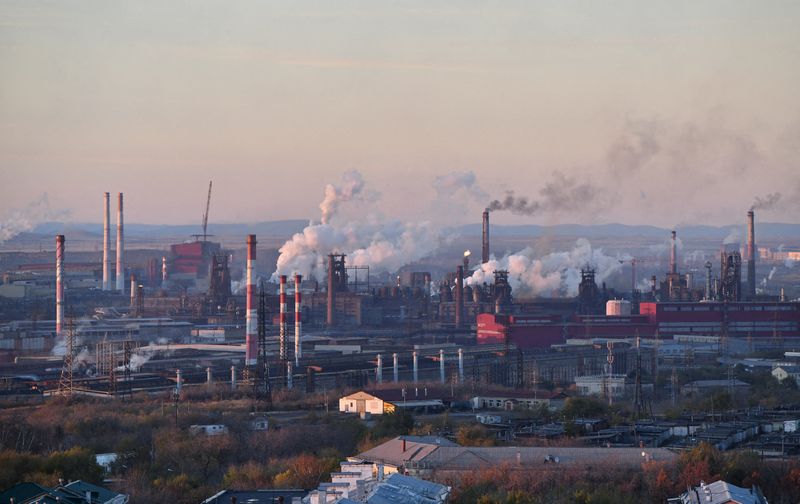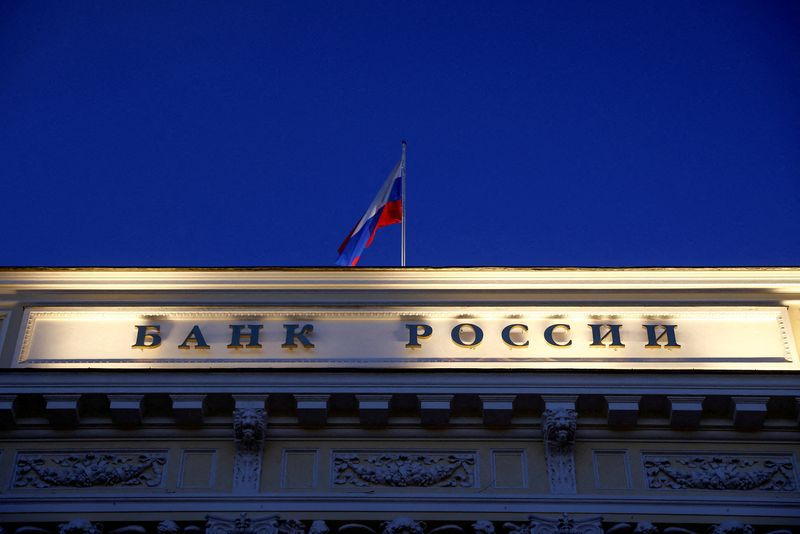By Anastasia Lyrchikova, Alexander Marrow and Darya Korsunskaya
MOSCOW (Reuters) - A growing chorus of Russian industrial companies and lobby groups are complaining of prohibitively high interest rates and warning that goals for infrastructure development may be missed, with the central bank bearing the brunt of the criticism.
Seeking to combat stubbornly high inflation amid soaring government spending on the conflict in Ukraine and rouble weakness, the Bank of Russia is widely expected to raise its key interest rate by at least 100 basis points to 20% when it meets on Friday, a headache for firms who say they already face exorbitant borrowing costs.
Heads of major state companies and business lobby groups say the issue has now become critical, threatening to derail future investment projects and economic growth.
Inflation, currently running at around 8.5%, ultimately poses more manageable challenges than such high interest rates, Russian billionaire Alexey Mordashov, steelmaker Severstal's largest shareholder, said in early October.
"The need to raise rates to limit inflation is clear, but we are starting to go too far," Mordashov said. "We are coming to a situation where the medicine may become more dangerous than the disease."
There are worrying signs that businesses are limiting financing of investment projects, preferring to hold funds in high-rate deposit accounts, which will impede development and economic growth, Mordashov said.
High military spending has fuelled a rebound in economic growth from a 1.2% contraction in 2022. Russia's GDP rose 3.6% last year and the economy ministry expects growth of 3.9% this year.
Sergei Chemezov, head of state industrial conglomerate Rostec, said high-tech sectors were the drivers of development but the central bank's high key rate was putting the brakes on further industrial growth.
"It renders (new) loans for companies' further development practically meaningless," he said at an October meeting between defence companies and machine builders.
The central bank did not respond to a request for comment. Last week, the bank repeated that tight monetary policy would be needed for a long time as inflation pressures remain strong.
ELECTRICITY PRICE RISES
In the capital-intensive power sector, the capacity to build new plants and modernise old ones is dwindling. High inflation has sharply raised equipment costs, and Western sanctions over the Ukraine conflict have curbed Russia's access to technology.
The level of the key rate means interest now makes up the bulk of loan repayments, said Alexandra Panina, head of the board of Russia's Council of Energy Producers.
"The current rate significantly weighs down the cost of investment projects," Panina told Reuters. "Further growth of the key rate will trigger further price rises for energy projects and, accordingly, of electricity prices in Russia.
"We need to fight to maintain the efficiency of our energy system."
From 2025-2042, Russia wants to install more than 90 gigawatts of new electricity capacity, which could cost around 40 trillion roubles ($414 billion), to cover the economy's growing needs and avoid possible shortages.
Unusually hot weather and an accident at the Rostov nuclear power plant caused mass power outages and blackouts in several southern regions this summer, eliciting rare public protests in the city of Krasnodar.
Credit costs will account for over 50% of final electricity costs if rates stay this high for long, said Alexei Ilchuk, head of the energy ministry's analytical group on the power sector.
"This is a fundamental obstacle to the further development of the industry and capacity renewal."
"MONEY IS TOO EXPENSIVE"
High rates are already hitting the construction, energy and steel sectors.
Panina said some construction tenders for power plants in Siberia and southern Russia have partially failed due to the high cost of borrowed funds. Seven companies are discussing abandoning 17 projects with a capacity of 2.13 gigawatts, she said.
Steelmaker MMK last week blamed high interest rates as one of the reasons for an 18.7% drop in quarter-on-quarter sales.
At a forum in Sochi this month, Gazprom (MCX:GAZP) Energoholding declared in a presentation that "money is too expensive".
Smaller firms, too, are tightening their belts.
Alexander Kalinin, head of SME lobby group Opora Rossii, said he expects interest rates on loans for SMEs to be 30% next year, which will reduce investments and be negative for economic growth, but may produce the cooling the central bank is seeking.
"The rate level is already critical," Kalinin told Reuters, pointing to two main negative factors for SMEs: the rising cost of capital and the lack of labour.
Russian oil traders are also feeling the pain of the high interest rate as it has increased the price of trade financing for energy exports.
According to three traders, a number of trading firms had to leave the market as they were barely making a profit after paying for the oil, the transport and the cost of the loan.
What unites most criticism and pleas for help is blaming the central bank.
Though many companies may be struggling because what Moscow calls its "special military operation" in Ukraine has cut Russia off from key export markets and revenue potential, blaming the Kremlin is not an option in Russia's current political climate, said Yevgeny Nadorshin, chief economist at PF Capital.

"Everyone who has development difficulties and a lot of debt is in a lot of pain right now," Nadorshin told Reuters. "It's no fun at all, so where do you go? The central bank can still be criticised."
($1 = 96.5455 roubles)
